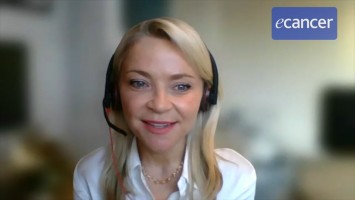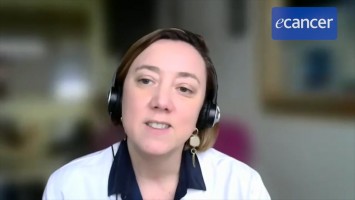WCGC 14
Colorectal cancer in the elderly
Dr Demetris Papamichael – BO Cyprus Oncology Centre, Nicosia, Cyprus
Colorectal cancer is, one might say, a disease of the elderly with a median age at presentation of around 71-72. So it is a very relevant disease for this age group in fact. You’re more likely to develop colorectal cancer if you are in your seventh or eighth decade of life.
What are some of the treatment options in the adjuvant and metastatic setting?
Coming to the adjuvant setting, adjuvant chemotherapy is an established treatment for patients who’ve had their tumours resected and we know that this can improve or increase the cure rate. Now, when we’re dealing with older patients, this can become a bit of a problem because the efficacy of adjuvant chemotherapy may in fact compete with an attrition rate, deaths from other causes, that have nothing to do with colorectal cancer but these are the illnesses that tend to be found in older patients.
The management of metastatic disease is another huge chapter, of course. Most of the information that we have comes from clinical trials that have not really included many older patients. A lot of these trials have an age cut-off which runs up to 75 usually and it’s only recently that we’ve had elderly specific trials being designed to look into the issues of efficacy and tolerability in older patients. So it’s only now, over the last three or four years, that we’ve started gathering data that can help us manage these patients more effectively and more appropriately.
What are some of the controversial issues in this area?
The first one I’ve already touched upon, it’s the adjuvant issue, the issue of adjuvant chemotherapy and in particular the use of combination chemotherapy, the use of FOLFOX or XELOX is the standard of care for patients with node positive colon cancer in an adjuvant setting but some of the data that have come out recently suggest that the use of combination chemotherapy is, in fact, not as effective when it comes to the over 70s. So for these patients some people recommend single agent 5FU although I think the question is still out there, it hasn’t been answered properly yet. Other controversies in the metastatic setting relate to the fact that we have very few data when it comes to the really old patients. It is OK if you have fit elderly up to the age of 75, they can usually be treated in the same way that other patients are treated and you expect to see the same sort of outcomes and toxicity. But for the really old patients, the data that are emerging suggest that you have shorter survival and poorer tolerability.
Are there any tools for determining if a patient is fit for the treatment?
There is a very good tool called a comprehensive geriatric assessment which can identify problems, can identify comorbidities and really place the patient into three different categories: those who are fit, those who have some minor frailties and those who are unfit. For the first group one might consider full dose chemotherapy; for the second group, dose modifications but treatment and for the third group, really one would suggest best supportive care. But a comprehensive geriatric assessment is a cumbersome tool because it’s difficult to carry out in an everyday clinic. So a number of researchers are trying to come up with more user-friendly tools that can be used in the daily practice.
Are there any points you would like to highlight?
The two most important points relate one to the adjuvant setting and the poor efficacy of combination chemotherapy and the fact that one has to be very careful when it comes to the over-75s because we have very few data in this group. The second point relates to the metastatic setting and the fact that we have emerging data from elderly-specific trials that are really quite useful.
What does the future hold for this area?
I think we have a lot more trials to look forward to which are specifically designed with the elderly in mind and there are a number of these trials coming through large organisations such as the EORTC, the MRC and so on. So I think this is very exciting.








